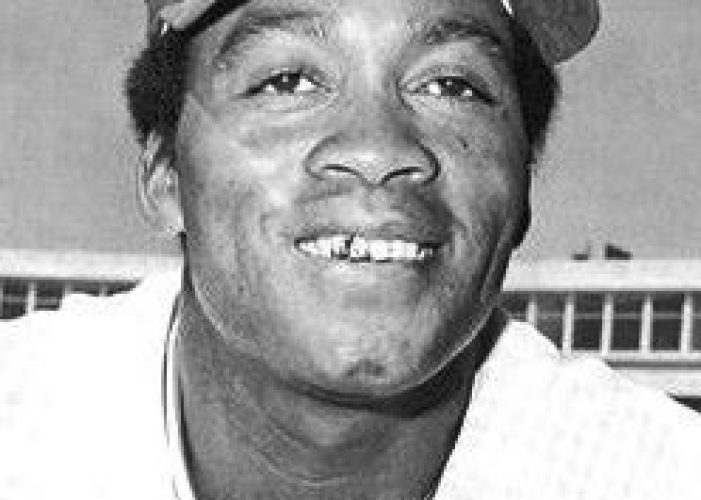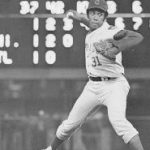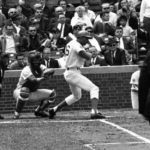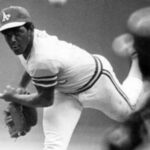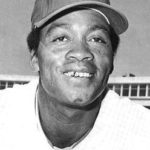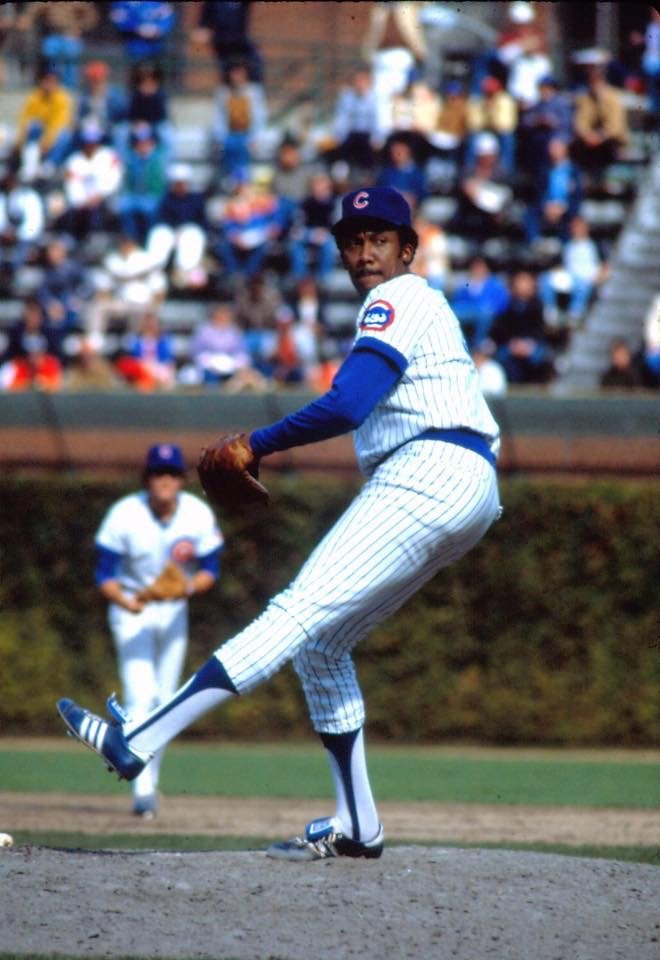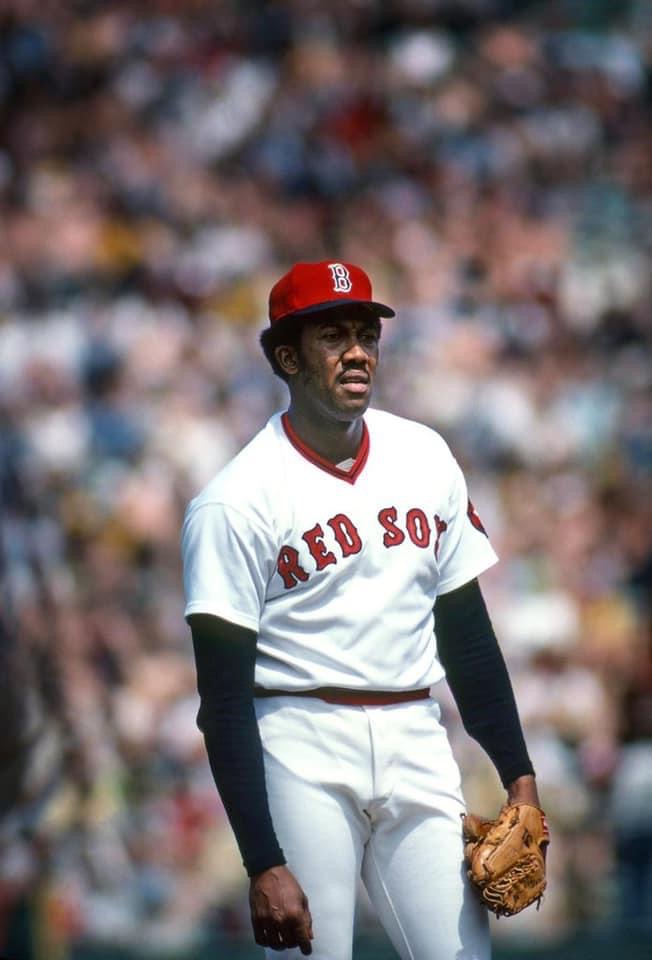VINTAGE BASEBALL MEMORABILIA
Vintage Baseball Memorabilia
Fergie Jenkins
Position: Pitcher
Bats: Right • Throws: Right
6-5, 205lb (196cm, 92kg)
Born: December 13, 1942 in Chatham, Canada
High School: Vocatonal HS (Chatham, ON)
Debut: September 10, 1965 (10,029th in MLB history)
vs. STL 4.1 IP, 2 H, 1 SO, 0 BB, 0 ER, W
Last Game: September 26, 1983
vs. PHI 1.0 IP, 2 H, 0 SO, 0 BB, 2 ER
Hall of Fame: Inducted as Player in 1991. (Voted by BBWAA on 334/443 ballots)
View Fergie Jenkins’s Page at the Baseball Hall of Fame (plaque, photos, videos).
Full Name: Ferguson Arthur Jenkins
Nicknames: Fly
Nine Players Who Debuted in 1965
Lee May
Mark Belanger
Bobby Murcer
Roy White
Steve Carlton
Tug McGraw
Fergie Jenkins
Jim Palmer
Catfish Hunter
The Fergie Jenkins Teammate Team
C: Carlton Fisk
1B: Carl Yastrzemski
2B: Ryne Sandberg
3B: Ron Santo
SS: Ernie Banks
LF: Billy Williams
CF: Al Oliver
RF: Dwight Evans
DH: Jim Rice
SP: Jim Bunning
SP: Gaylord Perry
SP: Robin Roberts
SP: Luis Tiant
RP: Lee Smith
M: Don Zimmer
Notable Events and Chronology for Fergie Jenkins Career
Biography
A man with two last names, Canadian-born Jenkins often had a single letter attached next to his line in the box score – “W”. Jenkins won 284 times in his 19-year career, spent mostly with the Chicago Cubs and Texas Rangers. He won twenty games six straight years, and seven times overall. Unfortunately, he never played on a first place team, and thus was denied the limelight of the post-season. A drug-bust in 1980 marred Jenkins image, but 11 years later he was voted into the Hall of Fame.
Jenkins had several unfortunate runs of bad luck that cost him notoriety. He lost thirteen games by the score of 1-0, despite going the distance for the loss. In addition, he suffered 45 shutout losses, the sixth highest total in history. His teams (Phillies, Cubs, Rangers, and Red Sox) were basically mediocre – they posted an almost exact .500 record in games Jenkins didn’t get a decision. In his games, they were .557. In 1969, his Cubs blew a lead and lost the division title to the Mets. In 1976 he joined Boston the season after they played in the World Series. With the Rangers he was never able to get to the post-season, due to poor management and waste of talent. In 1983 he retired with the Cubs, and the next season they finished first.
Jenkins was born east of Detroit – in Canada. He grew up playing hockey and wasn’t a pitcher until a teammate hurt his arm and Jenkins was forced onto the mound. In June, 1962 he was signed to his first pro contract, by the Phillies. In four seasons in the minors, Fergie went 43-26, and was finally given a shot in September of ’65 with Philadelphia.
He began the ’66 season in the Phils bullpen, but soon was packaged in a deal with the Cubs. The Phillies felt they needed veteran pitching to push them over the top. They traded Jenkins, Adolpho Phillips, and John Herrnstein to Chicago for pitchers Larry Jackson and Bob Buhl. Both pitchers better years were behind them – combined they won 47 games for the Phillies in three seasons. Jenkins would win 282 games for the Cubs and others. It was one of the worst trades in baseball history.
In his first game with the Cubs, Jenkins slugged a home run and won in relief. He was inserted in the rotation later in the year, winning six games. In 1967 he won twenty games for the first time. He followed with 20, 21, 22, 24, and 20 wins the next five years, through 1972. In 1971 he earned the Cy Young award (24-13, 2.77, 263 K’s). His string of 20-win seasons ended in 1973 (14-16), and the Cubs dealt him to the Rangers for young Bill Madlock. With Texas in ’74, Jenkins won a career-high 25 games and was voted the Comeback Player of the Year. In his first start with Texas, he blanked their rival Oakland A’s, 2-0, on one hit.
After winning 17 games for the Rangers in 1975, he was again traded, this time to defending AL champ Boston. He was never at home with the Sox, and struggled to a 22-21 record in two seasons. Once again he was shipped to Texas, where he anchored a staff that included fellow castoffs Jon Matlack, Doyle Alexander, and Gaylord Perry. Jenkins went 51-42 in his four-season, second-stint with Texas. The lowlight of the time with Texas comes on August 25, 1980, in Toronto, when Jenkins is arrested for possession of cocaine, at Exhibition Stadium. The ensuing publicity and brief trial cause a stir in Canada, where Jenkins is a hero. Finally, a sympathetic judge waves a guily verdict and exonerates Jenkins. MLB suspends Jenkins in September, but that ruling is also overturned after an arbitrator dismisses the claim.
After the ’81 season, Jenkins was a free agent and few teams showed interest. In a homecoming story, the Cubs took a chance on the 38-year old right-hander, signing their old ace. In ’82 he showed some flashes of his old success, winning 14 games and posting a 3.15 ERA. He finished up in 1983, struggling and ending up in the Cubs bullpen.
His career was marked by his incredible durability and control. He struck out more than 3,000 batters and is the only man to do so while also allowing less than 1,000 walks. In 1991 he was inducted into the Hall of Fame.
@ET-DC@eyJkeW5hbWljIjp0cnVlLCJjb250ZW50IjoicG9zdF90YWdzIiwic2V0dGluZ3MiOnsiYmVmb3JlIjoiTGVhcm4gTW9yZSBhYm91dCB0aGUgdGVhbXMsIHBsYXllcnMsIGJhbGwgcGFya3MgYW5kIGV2ZW50cyB0aGF0IGhhcHBlbmVkIG9uIHRoaXMgZGF0ZSBpbiBoaXN0b3J5IC0gLSAtIC0gLSAtIC0gIiwiYWZ0ZXIiOiIiLCJsaW5rX3RvX3Rlcm1fcGFnZSI6Im9uIiwic2VwYXJhdG9yIjoiIHwgIiwiY2F0ZWdvcnlfdHlwZSI6InBvc3RfdGFnIn19@
Factoids, Quotes, Strange Things
Best Season, 1971
His fifth of six straight twenty-victory seasons, Jenkins led the NL in complete games (30), innings (325), and fewest walks (1.02 per 9 innings). He went 24-13, had a 2.77 ERA, and finished second to Tom Seaver with 263 strikeouts. It was Seaver who finished second in the Cy Young voting, as Fergie won his only award.
Awards and Honors
1971 NL Cy Young
Where He Played: The Phillies tried to make him a relief pitcher in his first two seasons in the major leagues
Post-Season Notes
Jenkins was one of the greatest pitchers who never appeared in the post-season.
Milestones
On May 23, 1980, Jenkins won his 250th game, a 3-1, two-hit victory at the expense of the Oakland A’s… On May 25, 1982, Garry Templeton became the 3,000th strikeout victim of Jenkins. Jenkins became the seventh man to reach that plateau.
Transactions
Signed as an amateur free agent by Philadelphia Phillies (June 15, 1962); Traded by Philadelphia Phillies with Adolfo Phillips and John Herrnstein to Chicago Cubs in exchange for Larry Jackson and Bob Buhl (April 21, 1966); Traded by Chicago Cubs to Texas Rangers in exchange for Bill Madlock and Vic Harris (October 25, 1973); Traded by Texas Rangers to Boston Red Sox in exchange for Juan Beniquez, Steve Barr and a player to be named later (November 17, 1975) – Texas Rangers received Craig Skok (December 12, 1975); Traded by Boston Red Sox to Texas Rangers in exchange for John Poloni and cash (December 14, 1977); Granted free agency (November 13, 1981); Signed by Chicago Cubs (December 8, 1981); Released by Chicago Cubs (March 19, 1984).
The 12 Black Aces
Through 2004, twelve African-American pitchers had won 20-games in the major leagues. Of course, black pitchers had won twenty many times in the negro leagues, but these dozen, who, under the direction of Mudcat Grant, called themselves the “12 Black Aces,” are an exclusive club:
1. Don Newcombe
2. Sam Jones
3. Bob Gibson.
4. Mudcat Grant
5. Earl Wilson
6. Fergie Jenkins
7. Al Downing
8. Vida Blue
9. J.R. Richard
10. Mike Norris
11. Dwight Gooden
12. Dave Stewart
Quotes About Jenkins
“Of all the animals on the earth, the buffalo is the dumbest.” — Fergie Jenkins, on why he chose to call Zimmer a buffalo, rather than a gerbil.
All-Star Selections
1967 NL
1971 NL
1972 NL
Replaced
Dick Ellsworth, the defacto ace of the Cubs staff prior to Jenkins’ emergence in 1967. Jenkins was placed in the rotation in ’67 and won 20 games the next six years.
Replaced By
After Fergie retired following the ’83 season, Rick Reuschel took over for Jenkins on the Cubs as the resident veteran starting pitcher, in ’84.
Best Strength as a Player
Control…he averaged 55 walks per 250 innings pitched.
Largest Weakness as a Player
His teammates.
Other Resources & Links
View Player Bio from the SABR BioProject
View Player Info from the B-R Bullpen

